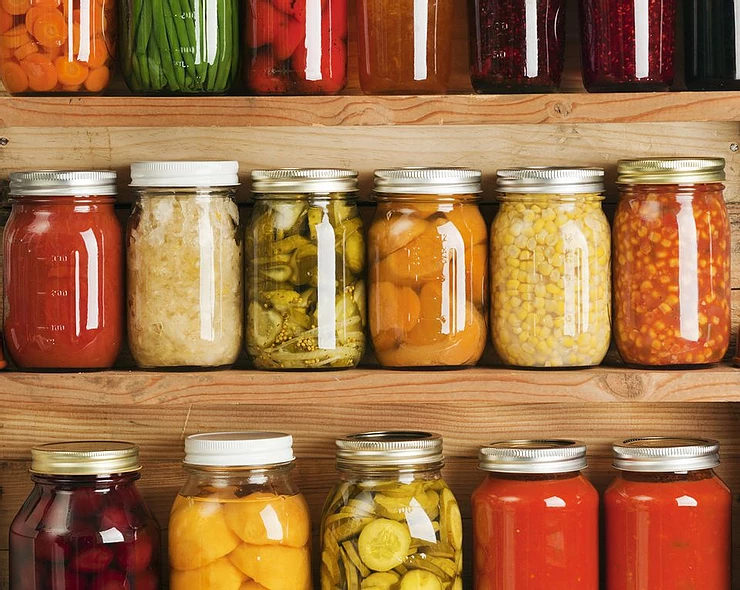In the ongoing COVID-19 situation, you gotta limit or avoid your visits to the grocery store, it’s extremely practical (and even recommended) to practice emergency preparedness. That doesn’t mean you should run to the nearest supermarket and buy all that you can —remember that hoarding food hurts communities!
So you might be wondering: What are the best foods to buy when you know you’re going to be stuck at home for a really long time — and is it even possible to consume a nutritious diet in such a situation? Well the answer is yes, in fact you should prioritise having a nutritious diet as this will improve your immune system, which is right now your best shield in the war against coronavirus.
Below is a list of foods that are not only nutritious but can also last long. They can be eaten solo, or with a combination of other foods to make a quick meal, they can also be used as an important ingredient base for several recipes.
1. Beans and legumes

Look for these on your next trip to the grocery store, because they’re not only long-lasting but also a great starting point for a nutrient-rich meal. Beans and legumes are rich in plant protein, fiber, B-vitamins, iron, calcium, potassium, phosphorus, and zinc. Most beans are also low in fat.
- Chickpeas
- Pinto beans
- Black beans
- Red Kidney beans
- Lentils
- Peas
- Limba beans
2. Whole Grains

Whole grains offer a complete package of health benefits, they deliver a variety of important nutrients, including vitamins, minerals, protein, fiber, and other healthy plant compounds. Whole Grains helps in boosting energy level, relieving stress, supports healthy digestion – all great benefits when you are locked at your home.
- Millets
- Quinoa
- Barley
- Sorghum
- Teff
- Oats
- Amaranth
- Wild Rice
3. Fresh fruits and vegetables with a long shelf life

Rich with much needed vitamins, minerals and proteins; these fresh fruits and vegetables when stored right and treated well can last weeks, months or maybe even more. These fruits and vegetables can be consumed in the raw form or as a base ingredient for most of your meals.
- Apples
- Pears
- Pomegranates
- Cabbage
- Onions
- Potatoes
- Beets
- Carrots
- Garlic
4. Citrus Fruits

Citrus fruits are sweet, brightly coloured juicy fruits that are packed with are an excellent source of vitamin C, a nutrient that strengthens the immune system and keeps your skin smooth and elastic. These fruits are often consumed during cold and flu season.
- Orange
- Lemon
- Lime
- Mandarin
- Grapefruit
- Pomelo
5. Squash

Squash is a versatile, flavourful and healthy food. All kinds of squashes – both winter and summer – are low in calories but rich in fibre, vitamins and many other nutrients. The health benefits of squash range from boosting your immune system and eyesight to guarding against inflammation.
- Butternut squash
- Acorn squash
- Pumpkin
- Spaghetti squash
- Zucchini
- Pattypan squash
6. Frozen Fruits

Frozen foods are an affordable way to get your daily dose of nutrients, they are packed with vitamins, minerals, carbohydrates, water, etc. During the freezing process the fruit’s nutrients are not lost and so they keep their benefits. When you bring the fruits to the table, you feel like, you just purchased it. Frozen fruits can last over a year when kept properly in the freezer.
- Strawberries
- Blueberries
- Blackberries
- Raspberries
- Cherries
- Peaches
- Pineapple
7. Frozen Veggies

Frozen vegetables are generally picked at peak ripeness, when they’re the most nutritious. So frozen veggies are as rich with nutrients as fresh vegetables, in fact sometimes frozen vegetables can be even healthier than fresh. Families who incorporate frozen foods into their normal routine may have better diet quality. Not to mention, in general, frozen vegetables are cheaper than fresh, so if you’re on a budget, frozen is a good option.
- Spinach
- Kale
- Cauliflower
- Broccoli
- Corn
- Peas
8. Nuts and Seeds

Think of Nuts and Seeds as supplements. These little foods are packed with a powerful punch of vitamins, minerals and fats. Due to the unique nutrient profiles of nuts and seeds, they are known to provide several health benefits which includes weight management, reducing risk of heart diseases and also of diabetes. These can be stored for a longer duration and also don’t consume much of space.
- Almonds
- Pistachios
- Walnuts
- Hazelnuts
- Cashews
- Peanuts
- Flax seeds
- Chia seeds
- Hemp seeds
- Sunflower seeds
- Pumpkin seeds
- Sesame

